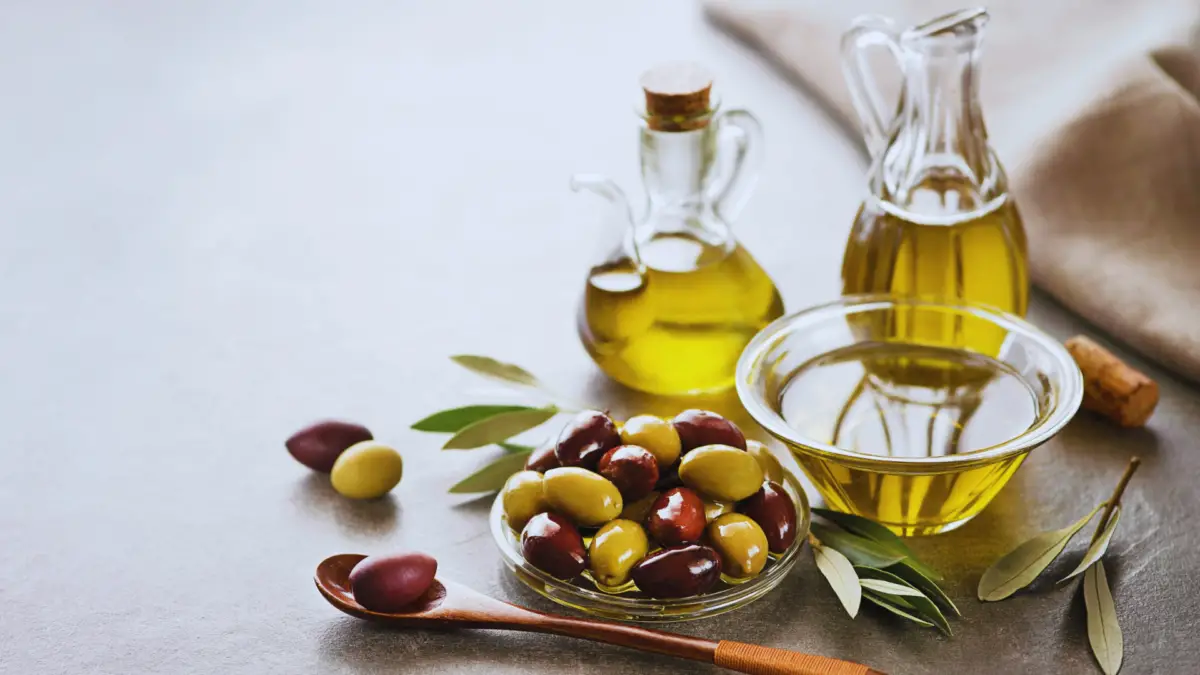Can I substitute olive oil for vegetable oil? In these cases yes!
Olive oil and vegetable oil are both healthy cooking oils but have different flavors and textures.
You can substitute olive oil for vegetable oil in most recipes, but there are a few times when you shouldn’t.

You can replace vegetable oil with olive oil in marinades, sauces, and when sautéing over low to medium heat in a 1:1 ratio. Don’t use it to cook at high heat because it has a low smoke point. But also, due to its powerful flavor, olive oil is not the best substitute for vegetable oil in baked goods.
In this quick guide, I’ll explain when substituting olive oil for vegetable oil is a good idea and when it’s not a good idea so you know how to substitute vegetable oil without altering your recipe too much.

Check out our new cookbook
Bitemybun's family recipes with complete meal planner and recipe guide.
Try it out for free with Kindle Unlimited:
Read for freeIn this post we'll cover:
Can you substitute olive oil for vegetable oil?
If you just ran out of vegetable oil, you probably wondering if olive oil is a good vegetable oil substitute?
Yes, in many cases you can use refined olive oil or EVOO (extra virgin olive oil) instead of vegetable oil.
Olive oil is best used for dishes that are savory or have a Mediterranean flavor, while vegetable oil is better for sweet or neutral dishes.
The best time to use olive oils to replace vegetable oil is if you’re looking for rich flavor in your dish.
Olive oil can be used as a substitute for vegetable oil when making homemade mayonnaise or salad dressings because it has many health benefits and a rich, robust flavor.
Keep in mind that olive oil has a lower smoke point than vegetable oil, so it’s not ideal for high-heat cooking.
Therefore, do not use olive oil for deep-frying instead of vegetable oil because it will smoke and give your food an off flavor.
The smoke point is very important because it’s the temperature at which the oil begins to smoke and break down.
When olive oil is heated to its smoke point, it releases free radicals that can be harmful to your health.
For this reason, it’s best to use olive oil for dishes that are cooked at a lower temperature or not heated at all.
In general, you can use refined olive oil or extra-virgin olive oil in place of vegetable oil, but there are a few things to keep in mind.
Extra-virgin olive oil has a lower smoke point than refined olive oil, so it’s not ideal for high-heat cooking or deep-frying.
The flavor of extra-virgin olive oil is also quite strong, so it’s not the best substitute for vegetable oil in baked goods.
If you want to use olive oil in a recipe that calls for vegetable oil, it’s best to use a refined olive oil or an extra-virgin olive oil that has been lightened with lemon juice or vinegar.
The bottom line: when you’re wondering whether you can substitute olive oil for vegetable oil, the answer is usually yes.
Both of these oils are healthy choices for your kitchen, and they can be used in a variety of ways.
Just keep in mind that olive oil has a strong flavor, so it’s not the best choice for every recipe.
Olive oil is not the only good substitute for vegetable oil and I explain other options here
Which type of olive oil to use instead of vegetable oil?
Cold-pressed olive oil is the best type of olive oil to use because it hasn’t been exposed to high temperatures during the production process.
This means that it retains more of its nutrients and has a higher smoke point.
Extra-virgin olive oil is also a good choice, but it has a lower smoke point than refined olive oil.
For this reason, it’s best for salad dressings (like in this delicious soba noodle salad), marinades, and other dishes that don’t require high heat.
Light olive oil is a good choice for a baking recipe compared to the other olive oils because it has a neutral flavor.
Learn more about the differences between the different kinds of olive oil here:
Also read: Is rice bran oil good for cooking? Read about its high smoke point
How to use olive oil as a vegetable oil substitute?
There are many ways to use olive oil as a vegetable oil substitute.
Some of the most popular ways include using it in salad dressings, marinades, and dipping sauces.
Olive oil can also be used in place of vegetable oil when baking cakes, cookies, and other desserts.
Just keep in mind that the flavor of olive oil is quite strong, so it’s best to use a light olive oil or an extra-virgin olive oil that has been lightened with lemon juice to keep the flavor similar to vegetable oils.
The usual substitution ratio is 1:1, but you may need to experiment to find the ratio that works best for your recipe.
Can you use olive oil instead of vegetable oil for baking?
Technically, yes you can use olive oil instead of vegetable oil in baked goods. However, the olive oil has quite a strong taste. It can give your baked goods a slightly bitter flavor.
Olive oil works best with Mediterranean fruitcakes, biscotti, and muffins with savory or nutty flavors.
Additionally, it frequently improves fruit or vegetable bread made with zucchini, cranberries, or pumpkin.
Sweets can benefit from the robust flavor of the olive oil too, so don’t be afraid to use olive oil instead of vegetable oil in your brownies.
If you want to use olive oil in baking, I recommend using light olive oil or mild-flavored olive oil. You could also try using half olive oil and half vegetable oil.
Bakers recommend using a 1:1 ratio but if you hate the strong flavor of olive oil, you can use 2 parts vegetable oil to 1 part olive oil.
Vegetable oils are generally used in baking because they produce a light texture and don’t have a strong flavor.
If you use olive oil in place of vegetable oil in a recipe, your baked goods will likely be denser and have a slightly different flavor.
Can you use olive oil instead of vegetable oil for frying?
No, you should not use olive oil for frying. The smoke point of olive oil is lower than the smoke point of vegetable oil.
This means that olive oil will smoke and break down at a lower temperature than vegetable oil.
Thus, deep-frying with olive oil is not a good idea because the oil will break down and your food will be soggy and greasy.
But it will also contain chemical compounds that are harmful to your health.
So, stick to vegetable oil for frying, like this restaurant-grade oil, and save the olive oil for salads and dipping sauces.
Vegetable oil vs olive oil
The main difference between olive oil and vegetable oil is the flavor. Olive oil has a strong, distinct flavor that can be off-putting in some dishes.
Vegetable oil, on the other hand, is neutral-tasting and won’t alter the flavor of your dish.
Another difference between these two oils is the smoke point. The smoke point is the temperature at which the oil begins to smoke and break down.
Olive oil has a lower smoke point whereas vegetable oil has a high smoke point.
Also, we have to look at how these oils are processed.
Olive oil is made from crushed olives, while vegetable oil is usually made from a blend of different oils.
So, vegetable oil is highly processed, while olive oil is only minimally processed.
Regular olive oil is made from olive fruit, but it has been refined to remove the strong flavor.
Extra-virgin olive oil is made from the first cold pressing of olives and has a higher quality since it retains the natural flavor of olives.
Now, when we refer to vegetable oils, we think of neutral oils like canola oil, sunflower oil, or refined peanut oil.
Many vegetable oils are a blend of different oils and they’re bland so they’re perfect for all your baking recipes.
Vegetable oil is a neutral oil and it also has a higher smoke point, which makes it ideal for high-heat cooking methods like deep frying.
The color is also light, so it won’t affect the color of your food. The texture is also light and runny, which makes it ideal for baked goods.
Olive oil, on the other hand, is a dark green oil that has a lower smoke point.
It’s best used for dishes that are cooked at a lower temperature or not heated at all. The flavor is also quite strong, so it’s not the best choice for baked goods.
So, should you use olive oil or vegetable oil? It really depends on what you’re cooking.
To make authentic Japanese mayonnaise yourself from scratch it’s best to use canola oil
FAQs
Can you use virgin olive oil instead of vegetable oil?
You can use virgin olive oil instead of vegetable oil, but the flavor will be very strong.
I recommend using a light olive oil or an extra-virgin olive oil that has been lightened with lemon juice.
Does olive oil taste like vegetable oil?
No, olive oil does not taste like vegetable oil. Olive oil has a strong, distinct flavor that can be off-putting in some dishes.
Vegetable oil, on the other hand, is neutral-tasting and won’t alter the flavor of your dish.
Is olive oil healthier than vegetable oil?
Olive oil is, like coconut oil, considered to be a healthy fat because it’s high in monounsaturated fats.
These are the “good” fats that can help lower your cholesterol and reduce your risk of heart disease.
Vegetable oil is also high in monounsaturated fats, but it also contains a significant amount of saturated fat.
Saturated fats are the “bad” fats that can raise your cholesterol and increase your risk of heart disease.
Due to health reasons, many people prefer to swap these two oils.
So, olive oil is the better choice if you’re looking for a healthy fat.
Takeaway
There are many oils on the supermarket shelves but when it comes to substitutions, you can generally use olive oils instead of vegetable oils.
The only case where it’s best to use something else instead of olive oil is when baking.
Olive oil’s strong flavors can overpower your final product and make cakes taste funky.
But overall, olive oil is a good substitute for vegetable oils when cooking and it doesn’t alter the taste of the food too much.
Read next: Best substitute for sesame oil | 12 alternatives for toasted and light
Check out our new cookbook
Bitemybun's family recipes with complete meal planner and recipe guide.
Try it out for free with Kindle Unlimited:
Read for freeJoost Nusselder, the founder of Bite My Bun is a content marketer, dad and loves trying out new food with Japanese food at the heart of his passion, and together with his team he's been creating in-depth blog articles since 2016 to help loyal readers with recipes and cooking tips.
